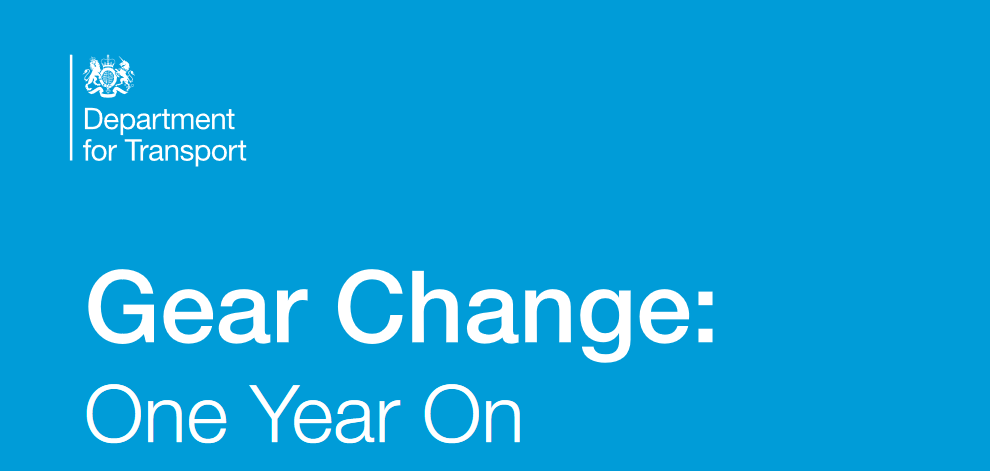“Gear Change: One Year On” is a review document published by the Department for Transport on 30 July, setting out the successes of the Emergency Active Travel Fund, and government’s 2020 policy “Gear Change” which included guidance for massively improved cycling infrastructure.
Whilst I’m writing this short(ish) summary of the Gear Change: One Year On, I’m struck by just how compelling the introduction is. Everyone should go and read it. Every naysayer; every “but I can’t possibly move without a car” touter; everyone who says “but what about when it rains” - JUST READ IT.
Here’s a summary. But really, do go and read it:
If we do nothing, road traffic will increase by 51% by 2050. Fifty one percent.
Just think about that for a minute. 51% more trips, 51% more parked cars, 51% more air pollution, 51% more road collisions. Of course, that’s a bit flippant, it’s more complicated than that. But still, just think about it. In Portsmouth. On your street. Where are they all going to go? What will it mean for our home? Our air? Our health? Our safety? Our climate?
The DfT sets out four options for dealing with this, and then discounts all but the last two as follows:
- Build more roads: means knocking down houses and doesn’t work anyway because time and time again, it’s induced demand for more driving
- Build more railways: takes too long (it’s a climate emergency)
- Congestion charging: this is part of the answer
- Make better use of the space we already have by giving it to modes that take up less room per passenger - which means buses, and bikes
The document focuses on option 4 and was released on Friday alongside an updated Highway Code, new Traffic Management rules, and a wad of cash for authorities willing to be bold in designing for walking and cycling (so not Portsmouth, or at least not yet). It sets out the lessons learned from the last year; a year in which highway authorities were told, in no uncertain terms, that they must make significant and meaningful changes to their networks to provide for walking and cycling.
In the last year, funding from government, and a ridiculous amount of work by local authority officers in an incredibly stressful time has delivered:
-
Hundreds of school streets which have dramatically reduced air pollution and increased numbers of children walking and cycling to school
-
Over 150 low traffic neighbourhoods where traffic has reduced and more people are choosing to walking and cycle
-
More than 100 miles of new segregated cycle lanes on main roads
-
£20m handed out through the fix your bike vouchers schemes and Dr Bike maintenance sessions
Bike sales went up 18%, e-bike sales increased 67%, cycling increased by 46% - that’s the highest it’s been since the sixties, when most households (about 70%) didn’t even have a car. It’s clear, people want to cycle when they don’t have to do it in traffic.
The document busts some myths around Low Traffic Neighbourhoods - sharing that for most schemes, traffic on boundary roads had reduced, not increased as feared. Emergency service call outs were analysed, finding that LTNs do not increase emergency service responses times, in fact they benefit public safety. They also reduce street crime and are more socially inclusive.
On public opinion - the review shares that “there is now clear evidence that neither the opposition - nor (their) passion - reflects public views.” The truth is, most people aren’t that bothered, and when they are professionally polled, more people support than oppose the types of schemes that have been delivered, by around 2:1.
The DfT states that:
“no scheme (or indeed almost any meaningful policy of any kind) will ever have unanimous support. Some councils appear to be searching for a formula which can make meaningful cycling and walking schemes acceptable to everyone, but this does not exist. We are clear that councils must not expect or require universal support and must avoid allowing any group to exercise a veto.”
If you haven’t gathered by now, I think you should go and read it. Or pass it on to your loved ones. To anyone who complains about the traffic, and the bike lanes, and the bus lanes, without a thought for their own complicity in the mammoth problem we’re facing.
In summary, the Gear Change: One Year On shows what we’ve known all along, but only a global pandemic gave us the chance to experience, if only for a little while: when you remove traffic and invest in cycling, the masses will cycle.

